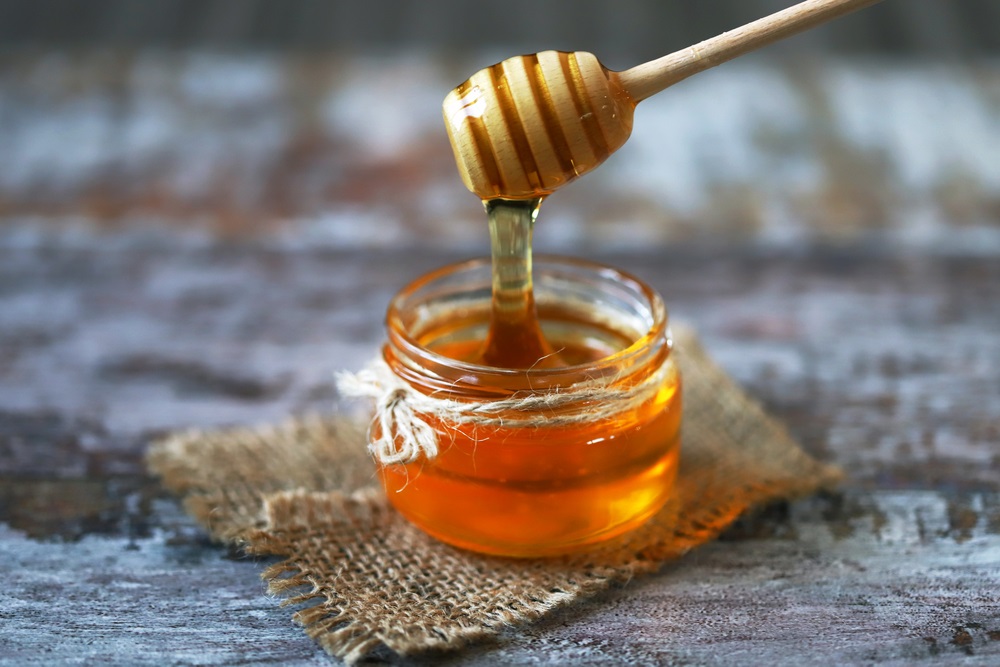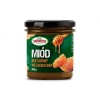
Honey is one of those products that everyone probably knows from childhood. Our grandmothers and mothers encouraged us to add it to tea or milk when we had a cold. But did you know that honey has many more uses than just sweetening drinks? This natural beekeeping product has a lot of beneficial properties. It is not without reason that it is called "liquid gold". Below you will read about what is honey good for and learn tips on how to fully use its potential.
Why is it worth reaching for honey?
It is impossible to overestimate the beneficial effects of honey on the body. It is not only a source of energy, but also a valuable ally in the fight against infections, improving immunity and supporting skin health. What's more, honey is a completely natural product, provided that you choose the high-quality one, preferably from local beekeepers. Its composition is a real treasure – simple sugars, enzymes, vitamins, minerals and antioxidants, which together create an extremely rich mixture supporting the body.
What distinguishes honey from other products is its diversity. You can choose Targroch linden nectar honey if you have a cough, Alce Nero coriander nectar honey if you want to improve your immunity, or Bio Planet multi-flower nectar honey as a universal addition to your daily diet. Each type of honey has slightly different properties, but they all have one thing in common – they are full of health benefits.
Honey is not only a tasty and natural product, but also a real source of health benefits. Its regular consumption can significantly affect immunity, aid digestion, and even improve the condition of the skin.
Does honey have antibacterial properties?
This is probably the most well-known use of honey. Thanks to its antibacterial and antiviral properties, it acts as a natural protective shield for the body. Enzymes present in honey, such as glucose oxidase, produce hydrogen peroxide – a substance with antiseptic properties. Regular consumption of honey can help prevent colds, and in the autumn and winter it provides excellent support for the immune system. What's more, honey is great for relieving symptoms of already developed infections. Warm tea with honey, ginger and lemon is not only a tasty drink, but also an effective way to fight a sore throat and cough.
What is raw honey good for?
Support for digestive system health
Honey has been used for years as a natural way to relieve stomach problems. It has a protective effect on the gastric mucosa, which makes it recommended for people with ulcers or hyperacidity. It also contains prebiotics, which support the development of beneficial bacteria in the intestines.
One of the most interesting uses of honey is its ability to relieve constipation. Just dissolve a teaspoon of honey in a glass of warm water and drink it on an empty stomach – this simple method often helps restore balance to the digestive system.
A source of energy and antioxidants
There is a reason why honey is often chosen by athletes and active people. Simple sugars, such as fructose and glucose, are quickly absorbed by the body, which makes honey an excellent source of energy. It is worth having it on hand as a natural "booster" before training or during long physical activity.
In addition, honey is rich in antioxidants, which protect cells from the effects of free radicals. It is these compounds that make honey support heart health, and also help prevent aging of the body and the development of chronic diseases.
Does honey have healing properties?
Honey also has external applications. For centuries, it has been used as a natural product for wounds, burns and skin irritations. Its antibacterial and moisturizing properties accelerate the regeneration process and also soothe inflammation. One of the best examples of such use is Bio Planet acacia nectar honey, it is especially recommended for use in cases of skin problems, such as difficult-to-heal wounds, because it contains a high amount of hydrogen peroxide – a natural compound with antibacterial effects. It is hydrogen peroxide, produced thanks to the bee enzyme – glucose oxidase, that is responsible for the ability of acacia honey to disinfect wounds. It has an antiseptic effect, inhibiting the growth of bacteria on damaged skin and creating conditions conducive to tissue regeneration.
How to incorporate honey into your daily life?
Honey is a product that can be used in many different ways. Here are some ideas:
· in the kitchen: add honey to tea, oatmeal, yogurt or use it as an ingredient in sauces and marinades. Remember, however, not to heat it above 40°C – high temperatures destroy its valuable properties,
· in cosmetics: use honey as a natural ingredient in face or hair masks. Its moisturizing properties are great for dry skin and damaged hair,
· in home medicine: prepare a homemade cough syrup with honey, lemon and ginger – it is a proven way to relieve cold symptoms.
What to look for fully enjoy the properties of honey, it is worth choosing a natural and high-quality product. The best choice will be honey from local beekeepers, which is not only fresh, but also free of artificial additives. Avoid artificial honeys, which may contain glucose-fructose syrups instead of real honey.
What is honey good for? Summary
Honey is one of the most versatile gifts of nature. It supports health on many levels – from improving immunity, through supporting the digestive system, to protecting the skin. Its regular consumption can bring many benefits, provided that you choose a natural product and use it in moderation.
Remember that honey is not only a healthy sweetener, but above all a natural way to improve the quality of life. Don't wait, try honey in your daily diet and see how much good it can bring you!


